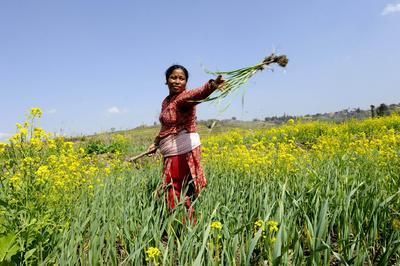During food price spikes — such as those in mid-2008, early 2011 and mid-2012 — governments restricted the export of food staples or lowered barriers to importing them. They hoped to keep increases in their domestic prices of rice, wheat, maize, and oilseed products low, reasoning that this would help their poor and stop people from falling into poverty. But there is new evidence to indicate that, while the practice tended to keep each country’s domestic prices down relative to the world prices at the time, it also contributed to the rise in international prices that was the original source of concern.
In a recent working paper we explore this phenomenon and find that such insulation from international price movements did not reduce global poverty in 2008. On the contrary, we estimate it may have increased poverty slightly (by 8 million people).
Sudden jumps in food prices can have serious social consequences. In mid-2008, the doubling of rice prices prompted urban riots in dozens of developing countries. Increases in food prices may have also contributed to the unrest before the Arab Spring. Food prices also disproportionally affect poor net buyers of food, who spend the majority of their incomes on food. So it is with good reason that national governments watch food prices carefully.
But policies aimed at insulating domestic food markets from price spikes had two other effects that actually increased poverty.
The first is that such policies hurt poor farmers and others who sold more food than they bought — and may have kept them from rising above the poverty line.
The second effect is more subtle, and double-barreled. By restricting exports or lowering import barriers on tradable food staples, price insulation policies exacerbated the international price spike. As a consequence, they may have driven more people into poverty in other countries than they helped in the countries where governments responded in that way.
This boost to international prices may also have undermined the desired effect at home. The policy may look successful when the rise in domestic food prices is compared to the actual rise in international markets. But a more relevant comparison is what the international price rise would have been had no countries altered their trade restrictions. Indeed, we have shown that if the same proportion of the world’s exporting and importing country groups happened to insulate to the same extent, domestic prices in both country groups would rise just as much as if no country had insulated. This is akin to a crowd of people of equal height in a stadium trying to see better by standing up.
In reality, however, countries intervene to different extents and the system of cause and effect is complex. The impact of price insulation on poverty in any one country depends on both the actions taken by that country and the collective impact of interventions by all other countries. It also depends on the structure of each economy and, in particular, on what proportion of households is near the poverty line and the proportions of those vulnerable households that are net buyers or sellers of staple foods.
Many scenarios are possible. If countries where the poor are most adversely affected by higher food prices insulate more than countries where the poor are less vulnerable to (or would benefit from) food price spikes, the price insulation may reduce the number of people who are driven into poverty. By contrast, in some net food-exporting countries such as Vietnam, higher food prices may actually reduce poverty because there are many relatively poor farmers who are net sellers of food.
To sort out the actual net effects of recent food-trade restrictions, we looked at data on the changes in agricultural trade restrictions during periods of rapid increases in international food prices, and estimated the impacts of consequent domestic price changes on poverty in different countries.
Our study finds that the actual poverty-reducing impacts of insulation are much less than their apparent impact. If we ignore the impact of policy actions on international prices, we estimate that 82 million people were saved from falling below the US$1.25 international poverty line. But, if we take into account the impact on international food prices — so as to better reflect reality — we estimate that global poverty increased by 8 million people (though that result is not significantly different from zero). In South Asia, the difference is dramatic: the estimated number saved from poverty there falls from 70 million to virtually none.
One implication of these findings is clear: trade policy is not the best instrument to fight poverty. Much better suited for that goal are domestic policy instruments such as conditional transfers, which provide social protection for the poor far more efficiently and equitably than variations in border restrictions. It is time to seek a multilateral agreement to desist from changing restrictions on trade when international food prices spike, and to focus on measures that actually reduce — rather than merely rearrange — the adverse impacts of high food prices on the poor.
Kym Anderson is Professor of Economics at the Arndt-Corden Department of Economics, Crawford School of Public Policy, ANU, and the George Gollin Professor of Economics at the University of Adelaide. Maros Ivanic is an economist with the Agriculture and Rural Development research team at the World Bank. Will Martin is the Research Manager of the Agriculture and Rural Development team at the World Bank.
This article is based on the ANU Trade and Development Working Paper, ‘Food Price Spikes, Price Insulation, and Poverty’.

